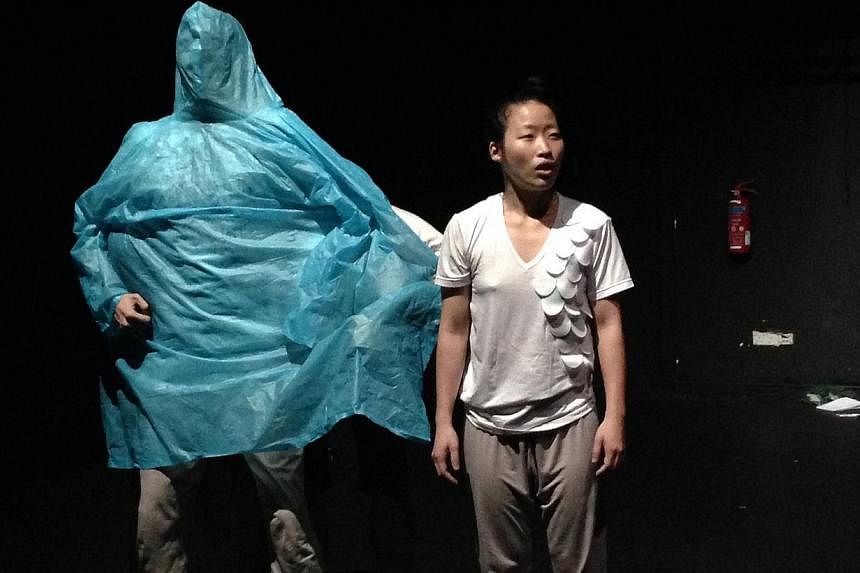In July, Foreign Policy magazine published a thorough examination on surveillance in Singapore for "the greater good" - and how many Singaporeans did not really seem to care.
Journalist Shane Harris wrote: "Singaporeans speak, often reverently, of the 'social contract' between the people and their government. They have consciously chosen to surrender certain civil liberties and individual freedoms in exchange for fundamental guarantees: security, education, affordable housing, health care."
Curtailed civil liberties and a lack of autonomy are what I had in mind when I prepared myself for Eng Kai Er's experimental physical theatre riot, Fish, a product of her 11/2 years in The Substation's Directors' Lab. It was staged at the Lasalle College of the Arts' Creative Cube.
Fish, as I understood from its description, aimed to interrogate notions of freedom. This might seem like a lazy challenge to any Singaporean; while important, it is the easiest and most simplistic quarrel to pick with the way the country is governed. First-time director and dancer-choreographer Eng, however, chooses instead to thrust a wild, self-aware, quicksilvered creature at us, asserting her freedom to create whatever it is about freedom that she wants to create. And it was baffling and it was splendid.
Fish is an hour-long set of scenes, loosely (if at all) connected by a set of parable-type narratives about tiny fish striving for some sort of freedom or free will, but all subverted in some way. One doesn't have an ending. Another, in which a fish asks a mountain to move, says its characters had a "long and inconclusive argument". Its examinations of freedom are more visceral than textual, and they occur on many levels, sometimes simultaneously.
The four performers, including Eng herself, impose constraints on one another, whether in terms of dressing another performer, pushing him or her over, coercing another to stick to a specific rhythm, telling one another to shut up, or seemingly ignoring others completely. But they also exploit their freedoms to the hilt, singing and convulsing and contorting with great gusto, and throwing random scenery-chewers into the mix, including three absurd plastic chickens that squawk mournfully when squeezed.
Fish begins with a great amount of structure. The performers' movements are visibly choreographed, and the mood is so serious one might be forgiven for believing that this was a work about the lack of freedom. There are moments where the work is truly haphazard, stitched together crudely at the seams. Some scenes inch by painfully, long enough for audience members to shift uncomfortably in their seats. Others lack memorable images, cast adrift by repetitive floor exercises.
But does it matter? The rigid lines of Fish's exposition slowly but surely come apart in a joyful and terrible chaos, a conclusion that sees Eng and fellow performer Vincent Chia stripping naked and roaming the stage with infectious, giddy euphoria, discarding the previous sense of melancholy and replacing it with unrestrained glee.
Public nakedness tends to be confronting in Singapore, and Eng herself had an unfortunate brush with the law when she and a partner walked naked through Holland Village several years ago. But this new, sanctioned act of nudity, within the confines of the stage, feels almost vindicating.
The audience, of course, has the freedom to leave whenever they want. But they mostly stay for a while - possibly gathering their scattered thoughts the way I am when the lights come back on, and the performers continue to perform even as the show comes to an end.
The last image I remember is of Eng rollerblading nude, arms outstretched, grinning, whirling about the stage; audience members exchange smiles as they exit - some nervous, some bashful, but all tacitly complicit and envious, perhaps, of the wild abandon unfurling on stage, the way we might have danced naked as children who did not know our nakedness.
Follow Corrie Tan on Twitter @CorrieTan


